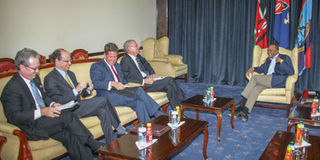Envoys only managed to display their disrespect

PHOTO | PSCU President Uhuru Kenyatta with (from left) High Commissioner of Australia Mr Geoff Tooth, High Commissioner of Canada Mr David Angell, High Commissioner of the United Kingdom Dr Christian Turner and Ambassador of United States of America Mr Robert F. Godec at State House, Nairobi where the envoys paid a courtesy call on the President.
What you need to know:
- Without expatriates, we are rudderless. Our talent, natural resources and state machinery are not at all good for us — like a razor in a babe’s hand, they must devise subtle tricks to save us from ourselves.
- These questions are important for anyone trying to understand why envoys would choose to libel a government so gratuitously, in so disrespectful a medium.
International relations have mutated into something truly confounding. In an age where unilateral waging of war, whimsical instigation of regime change and other cynical manoeuvring are everyday occurrences, this should not be surprising. We are not strangers to this phenomenon.
“Rogue ambassadors” have got up to the most outlandish derring-do hereabouts, as genteel Englishmen contemptuously accused us, barefoot natives, of vomiting on their shoes! Others have warned us of consequences. All this because, it does turn out, Kenya is not permitted to take decisions incompatible with these foreigners’ interests. To hell with sovereignty.
Last week, a bunch of Western envoys — and I defy you to show me anyone else in that roll — published a stiflingly officious homily on corruption (Act on corruption now, 18 envoys challenge Uhuru, Sunday Nation April 13). They alleged, without once citing a single instance of corruption initiated or condoned by the government, that Kenya is perishing under a horrible plague of graft.
Having laid down this spurious verdict, they went ahead and declared their readiness to support the government get back on its feet. The sheer cheek of it!
Who, but the most accomplished snake oil salesman can prescribe a nifty concoction for a non-existent ailment? I am certain that the envoys already have proposals on civic education and endless seminars presided over by spectacularly dull expatriates, and charged on poor Wanjiku. We have walked this journey before.
What is truly offensive about this latest pontificating is that it speaks to a most harrowing part of Kenyan and African history. Western know-it-all preaching to the natives is as old as written history.
These sanctimonious Euro-Americans are the lamp-lighters who must stand ready to enlighten the benighted natives of the Dark Continent. They preach fervently, but with one beady eye swivelling urgently, looking for opportunity.
We are ignorant, savage and incorrigible. We should not be entrusted with our destiny, much less the conduct of basic affairs.
Without expatriates, we are rudderless. Our talent, natural resources and state machinery are not at all good for us — like a razor in a babe’s hand, they must devise subtle tricks to save us from ourselves.
You will say I am being gratuitously scurrilous. How many envoys are accredited to Kenya? Don’t Asian countries have views on corruption? What about South Americans? What about Africans? Why is it that only certain envoys, mainly representing post-colonial dispensations, manage to congregate with ease and put together an op-ed (opinion article) critical of the government?
REGIONAL INFLUENCE
In 2007, I saw in graphic detail the magnitude of influence our actions have on our neighbours. When youths blocked roads and uprooted railway tracks, Uganda, Rwanda, Burundi, the Democratic Republic of Congo and South Sudan were starved of vital supplies. Kenyan refugees crossed the border, flocking into camps in Uganda. Our actions and failures had a direct impact on the well-being of fellow Africans.
Regional instability is a shared contagion, with small-arms, drugs, blood minerals as well as refugees trickling through borders. That is why East Africa and the Great Lakes now work on shared solutions and initiatives. Our shared destiny — including the trauma of a common post-colonial heritage — are the driving forces of regional integration.
One would think, therefore, that Kigali, Dodoma, Bujumbura, Kampala, Juba or Addis Ababa might have something useful to say about this-or-that thing happening in Kenya. Not to put too fine a point on it, Comesa and East African Community are massive trading partners and as a single country, Uganda is by far the biggest of them all.
Even if these neighbours did, would they publish an op-ed? Aren’t there established communication channels available to these swollen personages? Isn’t there a famous injunction against interfering in the internal affairs of your host country? Do these envoys’ compatriots customarily team up to publish trenchant op-eds in Washington, London, Bonn, Paris and so on?
It is a well-known fact that several of these envoys had more than ample opportunity to take up whatever issues they have at proper forums. What does this op-ed diplomatic practice mean: open-ended, uninhibited crassness?
When international norms are more effective in breach in some parts of the world, and the perpetrators of the breach bear a common denominator, is it far-fetched to plead discrimination? When the most egregious of these violations are visited on an African country by a league of American and European nations, might race be a factor?
I believe that when an important guest behaves out of turn in your homestead, he impeaches your legitimacy. It is an unbearably calculated and venomous calumny.
Since this is largely an agenda canvassed by the “essential contact” brigade, is there a deeper message, or are we in the throes of quotidian racism? Are we expected to get used to it, in the interest of acknowledging the realities of the global order?
These questions are important for anyone trying to understand why envoys would choose to libel a government so gratuitously, in so disrespectful a medium.
The writer is the director of speechwriting in the Presidential Strategic Communications Unit




